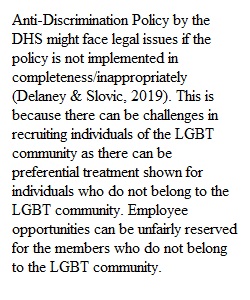


Q Legal Issues in Homeland Security Most Americans agree that homeland security and combating the threat of terrorism requires strong government action and a balancing of security with constitutionally protected civil liberties. But as the old saying goes, "the devil is in the details." A number of serious and complex legal issues arise when homeland security laws and policies are enforced, prosecuted, adjudicated, or executed. In the readings this week, you consider legal issues related to the use of racial and ethnic profiling to investigate potential terrorists, the use of data mining to collect intelligence, and the enforcement of laws such as the PATRIOT Act, as well as many other issues. As you read about each, you may find that even the most intelligent, reasonable, and well-intentioned people often disagree on these issues. To prepare for this Discussion: • • Review the article, "Homeland Security and Civil Liberties: Preserving America's Way of Life." Consider the legal issues related to using racial and ethnic profiling as a criterion to make stops, perform searches, and conduct investigations. Also, think about the laws that apply to the use of racial and ethnic profiling. • • Review the online article, "Report from the Field: The USA PATRIOT Act at Work." Reflect on the specific legal and constitutional issues related to the execution of the PATRIOT Act and think about how you would address these issues. • • Review the online article, "Homeland Security vs. the Madisonian Impulse: State Building and Anti-Statism After September 11." Think of the legal and constitutional issues that arose from the American system of federalism and separation of powers and think about how you would address these issues. • • Review the Executive Summary and Introduction of the online article, "Long-Term Legal Strategy Project for Preserving Security and Democratic Freedoms in the War on Terrorism." Focus on the analysis and recommendations regarding the competing viewpoints on the ten most difficult legal or constitutional issues regarding policies affecting security and civil liberties. Think about how you would resolve these issues. • • Select a homeland security policy or practice in which there are legal issues concerning the policy itself or how it is executed. The policy should be different than the one you selected in the first Discussion. • • Identify at least two legal issues related to the policy or practice you selected. • • Think about how you might address the legal issues, using specific laws. With these thoughts in mind: Post by Day 4 a brief description of the homeland security policy or practice you selected and explain how it is executed. Then, explain at least two legal issues related to the policy or practice. Finally, explain how you might address each legal issue. Be sure to refer to specific laws that apply. Note: Include the policy or practice you selected in the first line of your post. You will be asked to respond to a colleague who chose a different practice or policy. Be sure to support your postings and responses with specific references to the Learning Resources . Read a selection of your colleagues' postings. Respond by Day 7 to at least one of your colleagues' postings. Be sure to respond to a colleague who chose a different policy. Respond in one or more of the following ways: • Ask a probing question. • Share an insight from having read your colleague's posting. • Offer and support an opinion. • Validate an idea with your own experience. • Make a suggestion. • Expand on your colleague's posting. Return to this Discussion in a few days to read the responses to your initial posting. Note what you have learned and/or any insights you have gained as a result of the comments your colleagues made.
View Related Questions